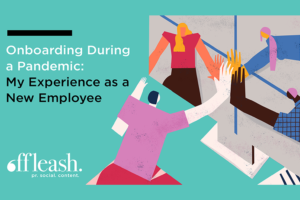Onboarding During a Pandemic: My Experience as a New Employee

Orienting new employees – aka onboarding – is one of the most important things a company does. According to a report by the U.S. Chamber of Commerce, “the onboarding process has been proven to directly correlate with higher employee retention and better business results. Businesses that onboard their new hires achieve nearly double the profit of companies that don’t follow any sort of onboarding strategy.”
With offices closed and everyone virtual, the pandemic has made it vastly more challenging to help new employees come up to speed and feel part of the team. As a report by search firm SPMB put it: “How the heck do we get this individual successfully launched and integrated in their new company outside of a traditional office setting?!”
I’ve experienced this challenge from the receiving end. I joined Offleash in June 2020, as quarantine was in full swing, and still have never spent a minute in an office with my fellow Offleashers.
On that first virtual day last year, I was pretty terrified. I was 23 and a little more than a year out of college. As an assistant account executive, I knew there would be a lot of work to get a handle on and many colleagues and clients to get to know, all quickly. How exactly was this going to work virtually, I wondered.
As I know now, my new bosses and teammates had thought all this through and were determined to make my onboarding as smooth as possible. No, I wouldn’t get to see everyone in person or grab lunch together, but otherwise, they wanted the onboarding experience to feel as normal as it could be under the circumstances.
First, I received the warmest welcome ever. The immediate “you’re one of us now” vibe that people showed me, albeit on computer screens, helped make up for the physical distance and the awkwardness of working with a slew of folks I’d never actually met.
Second, managers and others were very generous in helping me understand the tools, processes, and expectations of my job. It may sound obvious, but time is the greatest gift you can give any new employee – especially when they’re remote. It’s in everyone’s interest for the new employee to get off to the fastest start possible, but it can’t just happen automatically.
Third, communication was constant. I don’t just mean the work emails and slacks you’d expect but the other conversations that really helped make me feel a part of the culture. The whimsical question-of-the-day on one of the Slack channels (example: What movie could you watch over and over without getting sick of it?). The shoutouts for work well done. The Zoom happy hours. The sharing of pet photos.
On and on – all of it managing to reduce the sense of remoteness and reflecting a boundless positivity that made me feel so much at home.
On top of the pandemic, the world seemed to be up in flames during my initial months on the job — in the literal sense due to the California wildfires and also because of the unrest stemming from systemic racism and inequality and a polarized political climate. It was a lot to endure by myself, sitting in my San Francisco apartment. But the “we’re all in this together” vibe went a long way in making me feel grounded and bonded.
Other lessons that the company reinforced over and over in just about every agency-wide Zoom meeting and Slack conversation: The holistic wellness of employees is very important. We don’t do politics — a genuine support system is crucial to success. It’s okay to not have it all figured out (especially during tumultuous times). Expect the unexpected and roll with it. Make sure you find a way to laugh (even if it’s only at yourself).
Based on my experience, when it comes to onboarding remote employees, I’d advise other companies to be just as intentional. Make it all feel personal to the new employee, which is exactly what’s needed in a situation that can so easily feel impersonal.
Doing this well requires a ton of effort, but the result is well worth it: an employee who integrates seamlessly and hits the ground running.
Alex supports Offleash client teams with editorial assistance, speaking and award programs, and research. Contact Alex here